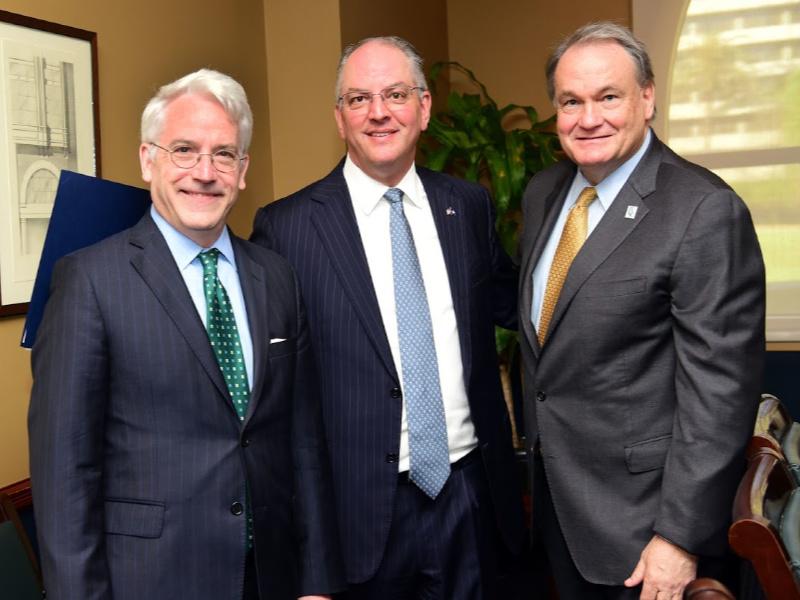Tulane Center for Environmental Law adds to already extensive program
Since 1972, Tulane has been a leader in the study of environmental issues and advocacy. Forty-six years later, it boasts one of the nation’s most comprehensive curricula in the field, the largest faculty-supervised environmental law clinic in the country and an influential think-tank on water law and policy.
Louisiana Gov. John Bel Edwards marked the official launch of the Tulane Center for Environmental Law with a keynote speech on March 21. The Center is a critical component to help save Louisiana’s fragile coastline while expanding the state’s expertise in the balance of natural resources, Gov. Edwards told those gathered at Tulane Law School.
The Tulane Environmental Law Center’s mission is to expand Tulane’s existing environmental program and ensure that it remains a world leader in the field while serving the public as a hub for research and discourse on emerging issues. The founding director of the new Center is Professor Mark Davis, the longtime director of the Tulane Institute for Water Resources Law and Policy and more recently of Tulane University’s ByWater Institute. Fundraising for a faculty chair, to be named in honor of Professor Oliver Houck, is already underway. Houck helped found Tulane’s environmental law program and remains one of the country’s most influential figures in the field.
The Center has also helped aid students in the Environmental and Energy Law Society and Environmental Law Journal, as well as those working on a certificate of specialization and LLM degree in the field. Additionally, the Center is focused on the Law School’s capacity to attract top faculty talent in the area of environmental law.
Begun with a generous gift from Doug McKeige (L'86), the Center is also a platform to raise substantial funding to support a significant expansion of Tulane’s strength in the field.
“Tulane’s leadership in environmental law has never been more important,” said Law Dean David Meyer. “This major initiative, with the launch of the Center and the ambitious effort to raise the resources necessary to its success, will ensure that Tulane faculty and world-class, Tulane-trained lawyer continue to lead the way in finding solutions to the vexing challenges that lie ahead.”
The Center’s March 21 launch kicked-off of Tulane’s 24th Annual Environmental Law and Policy Summit. The two-day Summit is one of the nation’s largest gatherings of scientific, legal, and policy experts addressing a comprehensive range of cutting-edge issues from wildlife and fisheries management to renewable energy policy. The event is fully student-led and organized, and has featured such notable names in the environmental movement as Jean-Michel Cousteau, son of the late Jacques Cousteau. The American Bar Association in 2014 recognized the Summit as the nation’s most outstanding student-led environmental program.
Last year, the Summit drew hundreds to the law school and featured keynote speakers Ruth Ann Castro (L’00), Senior Corporate Counsel at Google and Tulane Law alum, and Mark Hertsgaard, author of several books chronicling the policies of climate change as well as the recent rise of young people around the world demanding change.
On the first day of the Summit, Ruth spoke about Google’s efforts to provide renewable energy for their entire corporate footprint, from regional data centers to their corporate headquarters. She also spoke about how Google products are enhancing environmental protection regimes by providing enhanced mapping capabilities to respond to chemical outbreaks and unlicensed fishing.
In his keynote speech the following day, Hertsgaard reinforced the theme of the 24th Annual Summit in showing that young people are demanding change, not because they are worried about their children and grandchildren, but because projections show significant changes and challenges during their lifetimes. He highlighted the sense of urgency and the desire to change the toxic politics and policies that inspires the entire Summit.

